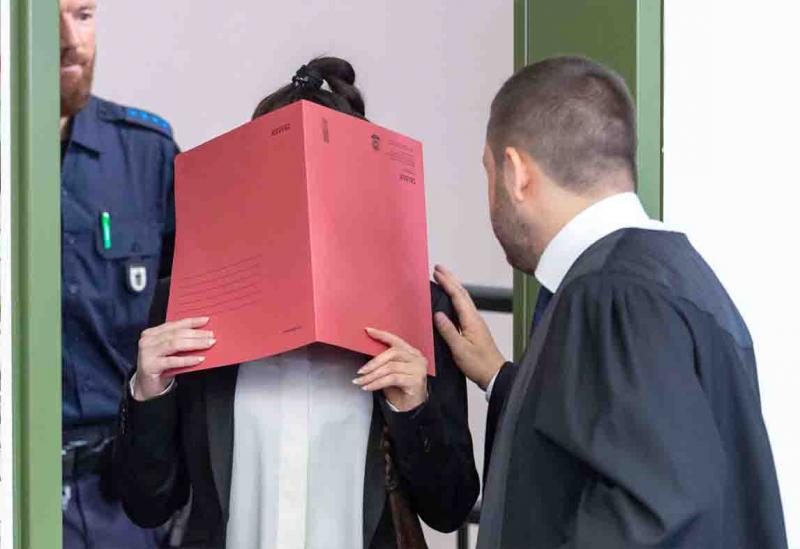An ‘international’ tribunal for ISIS fighters?

Complex process. A woman accused of joining ISIS (C) holds a red file lid in front of her face as she enters the courtroom in Munich, April 9. (DPA)
Today, Nuremberg could be a style, if not the template, for establishing a proper trial process for 21st-century crimes against humanity.
Sweden has begun moves to establish an international tribunal to try Islamic State (ISIS) fighters for crimes they are suspected of having committed in Iraq and Syria. The moves, however, have been limited to talks about talks and only it seems among Europeans.
There have been quiet discussions among Sweden and other European countries and invitations issued for a meeting June 3 in Stockholm. As of mid-May, Swedish Minister for Home Affairs Mikael Damberg was able to list only three confirmed summit participants — Britain, France and the Netherlands.
That’s not very many for a tribunal, which aspires to be international. ISIS, after all, drew its fighters from 80 countries.
However, enthusiasm for a collective solution will gather pace. Belgian Prime Minister Charles Michel mooted the idea in February and, in April, Austria’s now-sacked far-right interior minister, Herbert Kickl, said “tribunals in the region” should be a “pan-European project.” Kickl added that Sweden, Germany and Finland were supportive.
This suggests at least eight European countries are somewhat or very taken with the idea of an international ISIS court. If all goes according to the Swedish plan, there would be an Iraq-based tribunal that is properly funded and staffed and has both the authority and capacity to conduct a trial process.
Can this come to pass? More to the point, should it come to pass?
The second question is more easily answered than the first. The need is obvious. The Syrian Democratic Forces (SDF), a US-backed militia dominated by Kurds, has had custody of several thousand ISIS members since the beginning of the year. The SDF began an insistent call for an international court in March soon after the fall of Baghouz, ISIS’s last redoubt.
Failing to establish a court, the SDF said, each country should speedily repatriate its citizens because the militia was hard-pressed to hold large numbers of foreigners. The SDF’s plea for action did not seem to have had immediately discernible effect.
There have been scattered cases of repatriation to Europe — seven Swedish children of dead ISIS parents, for instance — but, in general, there’s been little attempt to take back adult Europeans involved with the extremist group, whether as fighters or as wives and mothers. There was little movement on the issue of an international tribunal right up to the end of March when a French Foreign Ministry spokesman crushingly described it as a “complex operation (whose) implementation would give rise to legal and practical difficulties.”
However, the French seem to be coming around to the idea or at least they are planning to go to the Stockholm summit. That might be the start of a viable effort but there’s always the chance it will yield nothing more than a few news releases and platitudes. Notably, the United States has not expressed support for the idea and it’s hard to see the Trump administration signing on to a multilateral endeavour.
Another problem with setting up an international tribunal is the public perception of motivation. Suspicion has been expressed about European nations’ sudden interest in doing justice by ISIS fighters. On account of their apparent inclination to leave ISIS-fighter citizens in the Middle East, all the better to mitigate potential security threats at home, it’s argued the tribunal is a cynical attempt to keep suspected terrorist sympathisers away from Europe. That may, admittedly, be a factor.
Even so, there is a belated recognition in some European capitals of the need to deal with citizens who fought for ISIS. As Damberg explained, a legal process is best pursued in the region the European fighter was arrested. It is “closer to witnesses… A local court in a Swedish small town does not really know realities in Iraq or Syria, actually, and it is difficult for them to gather any evidence in the region.”
All of this is true but it raises a further question: Will Europe want its own laws to apply thousands of kilometres away?
Germany and much of Europe are opposed to the death penalty. Belgium imposes only a 5-year prison sentence for joining ISIS. If a hypothetical ISIS fighter were convicted by a hypothetical tribunal, what procedures would be followed for his or her release from prison? Would the fighter be repatriated to Europe?
In the circumstances, a tribunal may take time — and many summits — to be set up, if it happens at all, but the precedent for it to be established is clear. After World War II, there came the year-long Nuremberg trials — flawed, contentious — but deliberately meant, as US President Harry Truman wanted, for the victorious Allied forces to “determine the innocence or guilt of the accused after a hearing as dispassionate as the times will permit.”
Today, Nuremberg could be a style, if not the template, for establishing a proper trial process for 21st-century crimes against humanity. One possibility would be for the UN Security Council to set up an ad hoc tribunal for ISIS, al-Qaeda and other jihadist groups and for it include Muslim jurists among international judges.
Justice would not only be done but, crucially, seen to be done.

